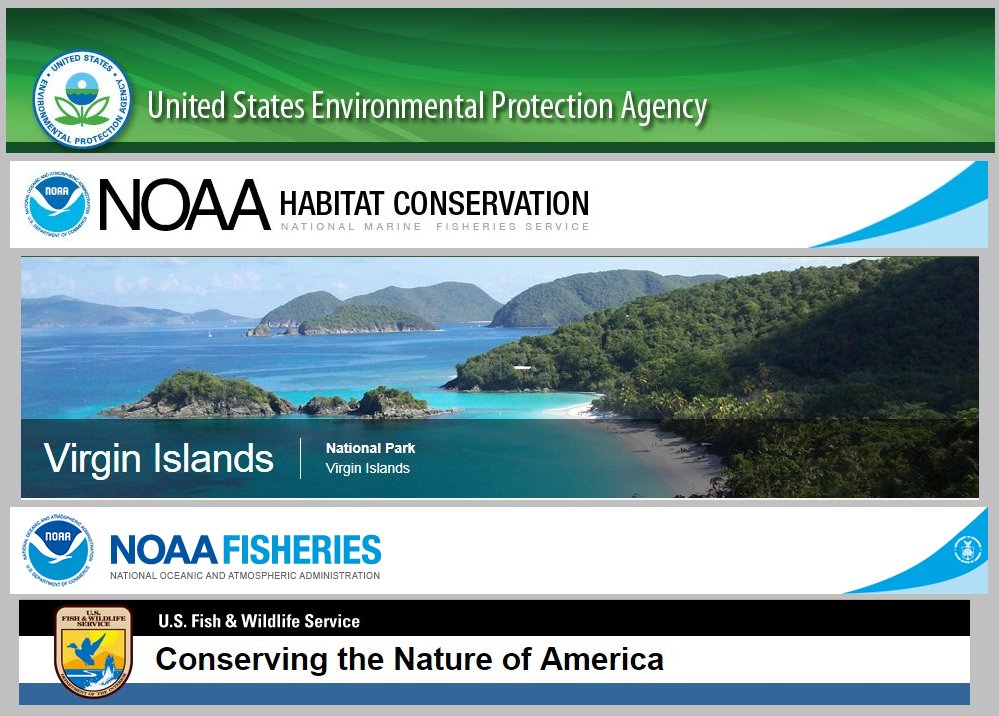 The response of all federal agencies to the Summers End Group permit application has been overwhelmingly negative. Every agency has stated in the strongest possible terms that the permit should either be denied, or extensive additional studies should be conducted to ascertain the extent of impact to critical resources.
The response of all federal agencies to the Summers End Group permit application has been overwhelmingly negative. Every agency has stated in the strongest possible terms that the permit should either be denied, or extensive additional studies should be conducted to ascertain the extent of impact to critical resources.
Here are the federal agency comment letters that we’ve reviewed so far. Click on each link for the full text of the agency comment letter.
- United States Environmental Protection Agency
The EPA states that the waters of Coral Bay are an “Aquatic Resource of National Importance.” This designation means that any permit application in Coral Bay may be subject to a higher level of Army Corps review, and that the EPA has ultimate veto power over a Department of the Army permit if the EPA is not satisfied with the recommendations of the Corps. The EPA’s recommendation was explicit – they said “After reviewing the available data, the U.S. Environmental Protection Agency (EPA) believes that this project will result in significant impacts to aquatic resources of national importance. EPA thus strongly recommends the denial of a Department of the Army permit for this project.” Here is the full text of the EPA comment letter:
United States Environmental Protection Agency (EPA) Comment Letter
- National Marine Fisheries Service (NMFS)
The National Marine Fisheries Service (NMFS) is responsible for conservation of Essential Fish Habitat (EFH). After analyzing the available information on probable impacts to Essential Fish Habitat, the NMFS letter states “In addition to the impacts to Aquatic Resources of National Importance, NMFS concludes the docking structure construction, mooring facility, and upland development will adversely impact EFH. Section 305(b)(4)(A) of the Magnuson-Stevens Act requires NMFS to provide EFH conservation recommendations when an activity is expected to adversely impact EFH. The Department of the Army shall not authorize the project as proposed.” Here is the full text of the NMFS comment letter:
NMFS – Habitat Conservation Division (Essential Fish Habitat / EFH) Comment Letter
- National Oceanic and Atmospheric Agency (NOAA)
NOAA is responsible for the protection of marine endangered species under the federal Endangered Species Act (ESA). Their comments concerned the lack of information provided by the applicant to assess potential impacts on endangered species. They said “After reviewing … the Environmental Assessment Report (EAR) prepared for the project, we continue to be unable to determine the potential extent of project impacts to (endangered species)“. They then say that “sea turtles are known to use Coral Bay … but, despite several requests, no sea turtle surveys have been conducted for the project.” They were also concerned about construction impacts – “quantification of potential acoustic impacts to sea turtles given that 1,333 piles will be driven in order to construct the proposed facilities” and in summary they expressed concern about “the potential extent of impacts to ESA resources due to the introduction of up to 235 new vessels to the area given the locations of ESA listed corals, acroporid coral critical habitat, and habitat for ESA listed sea turtles, as well as the presence of ESA listed sea turtles.” Here is the full text of the NOAA ESA comment letter:
NOAA Endangered Species Comment Letter
- National Park Service, Virgin Islands National Park
The Superintendent of the Virgin Islands National Park wrote “What is most disturbing … is the complete lack of consideration given by the applicant to the potential negative cumulative impacts to Park and Monument resources caused by the increased vessel traffic associated with the marina. There is no evidence of consideration or thought given to impacts on water quality, marine resources, wetlands (mangrove areas), coral reefs, sea grasses, fish and marine invertebrates and species of concern protected by the Endangered Species Act. There is no indication of consideration of impacts to Park and Monument soundscapes, lightscapes or cultural and archaeological resources; not to mention visitor use and experience. Given that the applicant indicates that the single most important reason for locating the marina in Coral Harbor is the proximity of Park and Monument resources, I would ask that your office not issue a permit until the impacts on these critical resources are adequately considered with mitigation for negative impacts identified and required as a condition of this permit.” Here is the full text of the National Parks Service letter:
National Park Service – Virgin Islands National Park Comment Letter
- United States Fish and Wildlife Service
The FWS cited numerous deficiencies in the application documents. They wrote “The project drawings are limited to the marina structure and dimensions are not given for the overall footprint. Information is not provided on the area to be occupied by the various mooring fields and engineering drawings are not provided for the mooring system. ” They cited the shark nursery as a concern: “The bay is recognized as a shark nursery with documented use by blacktip, lemon and nurse sharks which utilize this area to bear their young. This type of shark pup habitat is very important in maintaining a healthy population of these species.” The impacts on water quality were a particular concern: “removal of sea grass during construction, increased sedimentation and decreased water quality, shading, possible leaching of bottom paint, leaks of petroleum products, marine debris and other contaminant releases.” Based on these and many other concerns, US FWS concludes “We believe the direct and indirect impacts of this project have not been adequately assessed and mitigated. We recommend that the Corps place this permit application in abeyance until our concerns have been met.” Here is the full text of the US Fish and Wildlife Service comment letter:
US Fish and Wildlife Service Comment Letter
